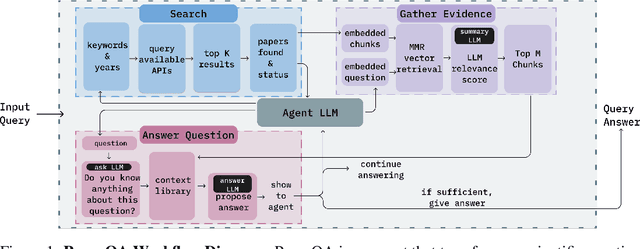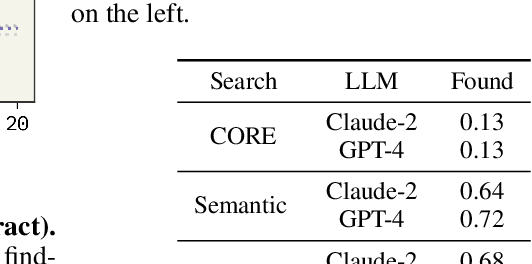Sam Cox
MDCrow: Automating Molecular Dynamics Workflows with Large Language Models
Feb 13, 2025



Abstract:Molecular dynamics (MD) simulations are essential for understanding biomolecular systems but remain challenging to automate. Recent advances in large language models (LLM) have demonstrated success in automating complex scientific tasks using LLM-based agents. In this paper, we introduce MDCrow, an agentic LLM assistant capable of automating MD workflows. MDCrow uses chain-of-thought over 40 expert-designed tools for handling and processing files, setting up simulations, analyzing the simulation outputs, and retrieving relevant information from literature and databases. We assess MDCrow's performance across 25 tasks of varying required subtasks and difficulty, and we evaluate the agent's robustness to both difficulty and prompt style. \texttt{gpt-4o} is able to complete complex tasks with low variance, followed closely by \texttt{llama3-405b}, a compelling open-source model. While prompt style does not influence the best models' performance, it has significant effects on smaller models.
Aviary: training language agents on challenging scientific tasks
Dec 30, 2024



Abstract:Solving complex real-world tasks requires cycles of actions and observations. This is particularly true in science, where tasks require many cycles of analysis, tool use, and experimentation. Language agents are promising for automating intellectual tasks in science because they can interact with tools via natural language or code. Yet their flexibility creates conceptual and practical challenges for software implementations, since agents may comprise non-standard components such as internal reasoning, planning, tool usage, as well as the inherent stochasticity of temperature-sampled language models. Here, we introduce Aviary, an extensible gymnasium for language agents. We formalize agents as policies solving language-grounded partially observable Markov decision processes, which we term language decision processes. We then implement five environments, including three challenging scientific environments: (1) manipulating DNA constructs for molecular cloning, (2) answering research questions by accessing scientific literature, and (3) engineering protein stability. These environments were selected for their focus on multi-step reasoning and their relevance to contemporary biology research. Finally, with online training and scaling inference-time compute, we show that language agents backed by open-source, non-frontier LLMs can match and exceed both frontier LLM agents and human experts on multiple tasks at up to 100x lower inference cost.
PaperQA: Retrieval-Augmented Generative Agent for Scientific Research
Dec 14, 2023



Abstract:Large Language Models (LLMs) generalize well across language tasks, but suffer from hallucinations and uninterpretability, making it difficult to assess their accuracy without ground-truth. Retrieval-Augmented Generation (RAG) models have been proposed to reduce hallucinations and provide provenance for how an answer was generated. Applying such models to the scientific literature may enable large-scale, systematic processing of scientific knowledge. We present PaperQA, a RAG agent for answering questions over the scientific literature. PaperQA is an agent that performs information retrieval across full-text scientific articles, assesses the relevance of sources and passages, and uses RAG to provide answers. Viewing this agent as a question answering model, we find it exceeds performance of existing LLMs and LLM agents on current science QA benchmarks. To push the field closer to how humans perform research on scientific literature, we also introduce LitQA, a more complex benchmark that requires retrieval and synthesis of information from full-text scientific papers across the literature. Finally, we demonstrate PaperQA's matches expert human researchers on LitQA.
14 Examples of How LLMs Can Transform Materials Science and Chemistry: A Reflection on a Large Language Model Hackathon
Jun 13, 2023



Abstract:Chemistry and materials science are complex. Recently, there have been great successes in addressing this complexity using data-driven or computational techniques. Yet, the necessity of input structured in very specific forms and the fact that there is an ever-growing number of tools creates usability and accessibility challenges. Coupled with the reality that much data in these disciplines is unstructured, the effectiveness of these tools is limited. Motivated by recent works that indicated that large language models (LLMs) might help address some of these issues, we organized a hackathon event on the applications of LLMs in chemistry, materials science, and beyond. This article chronicles the projects built as part of this hackathon. Participants employed LLMs for various applications, including predicting properties of molecules and materials, designing novel interfaces for tools, extracting knowledge from unstructured data, and developing new educational applications. The diverse topics and the fact that working prototypes could be generated in less than two days highlight that LLMs will profoundly impact the future of our fields. The rich collection of ideas and projects also indicates that the applications of LLMs are not limited to materials science and chemistry but offer potential benefits to a wide range of scientific disciplines.
ChemCrow: Augmenting large-language models with chemistry tools
Apr 12, 2023Abstract:Large-language models (LLMs) have recently shown strong performance in tasks across domains, but struggle with chemistry-related problems. Moreover, these models lack access to external knowledge sources, limiting their usefulness in scientific applications. In this study, we introduce ChemCrow, an LLM chemistry agent designed to accomplish tasks across organic synthesis, drug discovery, and materials design. By integrating 13 expert-designed tools, ChemCrow augments the LLM performance in chemistry, and new capabilities emerge. Our evaluation, including both LLM and expert human assessments, demonstrates ChemCrow's effectiveness in automating a diverse set of chemical tasks. Surprisingly, we find that GPT-4 as an evaluator cannot distinguish between clearly wrong GPT-4 completions and GPT-4 + ChemCrow performance. There is a significant risk of misuse of tools like ChemCrow and we discuss their potential harms. Employed responsibly, ChemCrow not only aids expert chemists and lowers barriers for non-experts, but also fosters scientific advancement by bridging the gap between experimental and computational chemistry.
 Add to Chrome
Add to Chrome Add to Firefox
Add to Firefox Add to Edge
Add to Edge